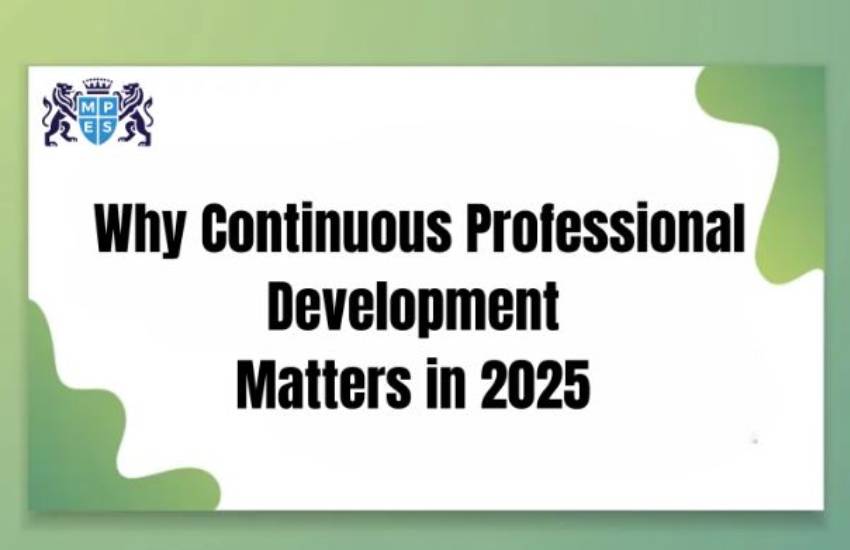Why Continuous Professional Development Matters in 2025

The work environments are changing, and professionals who want to succeed must keep pace with new demands and expectations. Whether you want to develop your skills or adapt to emerging trends, Leadership Courses and other developmental courses are key to staying competitive.
In 2025, the ability to Invest in Professional Development will be the dividing line between those who succeed and those who are left behind.
This blog explores why continuous professional development matters more than ever, helping you understand its role in shaping careers and driving organisational success.
Key Reasons Why Continuous Professional Development is Crucial
Continuous learning has become vital for growth and long-term success in the professional landscape. The key reasons why professionals in 2025 must embrace continuous learning are listed below:
1. Adapting to Rapid Technological Advancements
Technology is still advancing across industries, with factors such as artificial intelligence or AI, automation and data management becoming the norm. Failure to keep abreast with these changes puts these professionals vulnerable.
It is possible through participation in continuing professional development education because it enables you to gain the requisite skills and knowledge to address such technological shifts.
They guarantee that you’re not only on the right end of keeping up with technological trends but are also participating in advancement within your firm. In a fast-paced world, the need to upskill quickly is essential in any working environment.
Also Read: How to Be a Manager Everyone Respects: 7 Proven Strategies
2. Meeting the Demand for Evolved Leadership
There has been a significant shift in what is expected of leaders. Authority is no longer the only characteristic of modern leadership; flexibility, emotional intelligence, and the capacity to motivate groups are now valued more highly.
By taking leadership courses, professionals can acquire the skills to lead diverse teams, address difficult problems, and promote an innovative culture.
Leaders who engage in ongoing learning can better adapt their tactics and maintain effectiveness in changing work situations. Even seasoned executives risk being out of date without continual improvement.
3. Staying Competitive in the Job Market
Showing a dedication to development is crucial in a work market that is becoming increasingly competitive. Employers value employers who actively invest in professional development to advance their abilities.
You distinguish yourself from rivals by participating in continuous learning, demonstrating your commitment to professional and personal growth, and increasing your marketability.
Having up-to-date credentials, certificates, and abilities positions you for promotions, higher-level positions, and career progression.
The workforce of 2025 will be distinguished by its worldwide teamwork, adaptability, and variety. Workplace dynamics are changing due to remote work, multigenerational workforce, and cultural changes.
To handle these changes, professionals who embrace continuous learning are better equipped. You may develop solid relationships, promote inclusivity, and lead successfully in this new environment by taking courses emphasising communication, leadership, and cultural intelligence. You can succeed in any professional setting by adjusting to these changes.
5. Addressing Industry-Specific Changes
Every commodity and service sector, including the health and finance industries, education and technology, is changing at astounding rates.
The status of industry trends, changes in regulations, and best practices form the basis of success when prospecting or developing business strategies.
Such changes include changes in legislation and practice, continuous professional development means that the practitioner and the employee can stay up to date on such changes and fight such changes proactively. For example, leadership focused on particular industries supplements you with industry-specific skills and knowledge to meet or solve specific industry-related problems and bring success within your sector.
6. Preparing for Future Challenges
The future is uncertain, and 2025 holds attendant risks –economic risks, changes in consumer profile, and environmental risks among them.
Many professionals involved in ongoing professional development will know how to face such problems squarely. Self-education makes you creative, good at solving tasks, and ready to face new challenges – always being prepared is one of the essential skills. In light of architectural uncertainty, the most important feature is the company’s ability to prepare for future obstacles.
7. Empowering Personal Growth
Ongoing professional development is about more than just advancing your career; it’s also about changing yourself. Gaining new abilities increases self-assurance, broadens your viewpoint, and enables you to significantly contribute to your society and organisation.
When you invest in professional development, you invest in yourself, releasing potential you may not have known existed. A sense of fulfilment is fostered by personal growth, which enhances the satisfaction of your career path.
Conclusion
In 2025, ongoing professional growth will be essential rather than optional. The benefits of prioritising learning are obvious, from adjusting to technological developments to developing as a leader.
You can survive and thrive in your work by partnering with MPES Learning, taking leadership courses, and seizing growth opportunities. Those who remain inquisitive, dedicated, and willing to develop will be the ones who shape the future.






